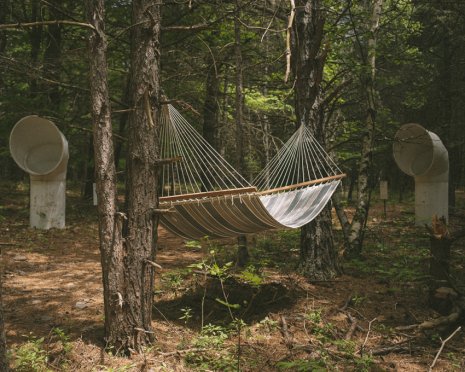In Yvette's Words...
As a composer and sound artist, I have been using "radio opera" to describe many of my compositions since 2011, although earlier works created at the Columbia Computer Music Center in the mid-1990s share similar characteristics with my current practice. My radio operas began as multichannel electroacoustic compositions designed to be experienced in total darkness, often reflecting historical events that may be challenging to listen to. “Radio” alludes to the Golden Age of radio drama when dialogue, music, and sound effects were combined in order to conjure images in the minds of the listeners, and “opera” indicates the scope of these long-form narrative compositions. These compositions weave music, sound design, and Foley with sound bites, computerized voices, actors and singers who give voice to archival texts and contemporary social commentary, creating space for reflection and dialogue.
My strongest works examine systemic inequities. The International African American Museum in Charleston installed a four-channel version of Destination Freedom as part of the permanent Passages exhibition, which is an integral part of the visitor experience, and it is also featured in my permanent installation Underground (Codes) at Wave Farm in Acra, NY. Destination Freedom leads the listener from the cargo hold of a ship transporting enslaved Africans to the Americas to a journey through time in search of freedom. My album Freedom, which includes Invisible People (A Radio Opera) and Destination Freedom, is described as “one of the most unique releases to chronicle the Black American experience” by The Wire, yet I would argue that my work speaks to a larger American, if not global experience. Histories cannot be siloed.
“A story doesn’t have to appeal to the heart; it can also appeal to the spine. Sometimes you want your heart to be warmed, and sometimes you want your spine to tingle.” This quote from Orson Welles has long inspired my approach to music-making. The strategic and manipulative deployment of language is a recurring theme in my work and sound allows me to reach listeners viscerally, in a way that words cannot. These compositions center on historical and social issues, often drawing from historical speeches, legal documents, religious texts, news media, manuals, and trolls, because I frequently encounter people who use language to deny other people’s right to exist. I want my work to hold a mirror up to society, not to shame or lecture, but to evoke empathy and understanding.
Thirteen years ago, I composed a piece for an improvising ensemble exploring the Middle Passage called Vernaculus II. As I described the conditions that enslaved Africans endured on ships, referring to 18th-century diagrams for slave ships like the Brookes, one musician laughed in disbelief, commenting on what they perceived as my dark humor. It was the first time this person learned about this history, and the level of disbelief motivated me to focus on historical narratives.
Recent projects have clarified my creative processes, goals, and aspirations; I have found my voice and can now see how all of my forms of expression inform one another. My projects often begin with a conversation that motivates me to explore the topic further through research and reflection. I begin collecting sounds (musical phrases, instrumentation, field recordings, Foley) and text which I organize into a storyboard. These sketches become electroacoustic compositions that are performed as multichannel fixed media experiences in darkened spaces. The compositions get a new life as they become the template for a score for staged performance. I initially began using studio recordings of my ensemble as source material that I would later manipulate into new sounds. In 2020, I started my Radio Opera Workshop ensemble as a vehicle for collaboration and live performance of my compositions. (The pandemic delayed the project's debut.) After touring with iterations of my ensemble, these workshops led to ideas for compositions for other ensembles like American Composers Orchestra and International Contemporary Ensemble. I balance improvised and notated, acoustic and electronic, and contrasting musical languages into my aesthetic of narrative composition.
Increasing threats to freedom of speech and expression of identity have created a sense of urgency. While I have made fortunate strides developing my tools and processes, cultivating collaborative relationships, performing and having my works performed internationally, I crave time needed to reach the potential of my vision. Two years ago, a sabbatical allowed me the luxury of uninterrupted creative progress. I discovered the thrill of sustained focus and the sensation of momentum after successive performances, residencies, and artist talks. My focus is to return to that state, where ideas can evolve without interruption and reach their fullest form.
My attention is directed towards amplifying the Radio Opera Workshop, including producing an album we recorded in 2023, and creating more opportunities for live performance, recordings, and scoring. I am developing an interactive album and seeking ways to engage new audiences with radio opera, informed by recent projects addressing the impact of the space tourism industry (T-Minus), climate change denial (Doubt, with historian Naomi Oreskes), and narrative technologies using game engines as a compositional tool (Extant). It has been a pleasure composing music for Barclay DeVeau's short film trilogy, The Cassandra Project, and I am eager to deepen this aspect of my practice through future partnerships. I have enjoyed broadening my solo modular synth practice, which I have performed at festivals such as Skaņu Mežs and Big Ears, into duo formats that allow for more intimate, collaborative exploration. Rather than touring, I am cultivating residencies that allow for spending time with a community and working with local artists.


